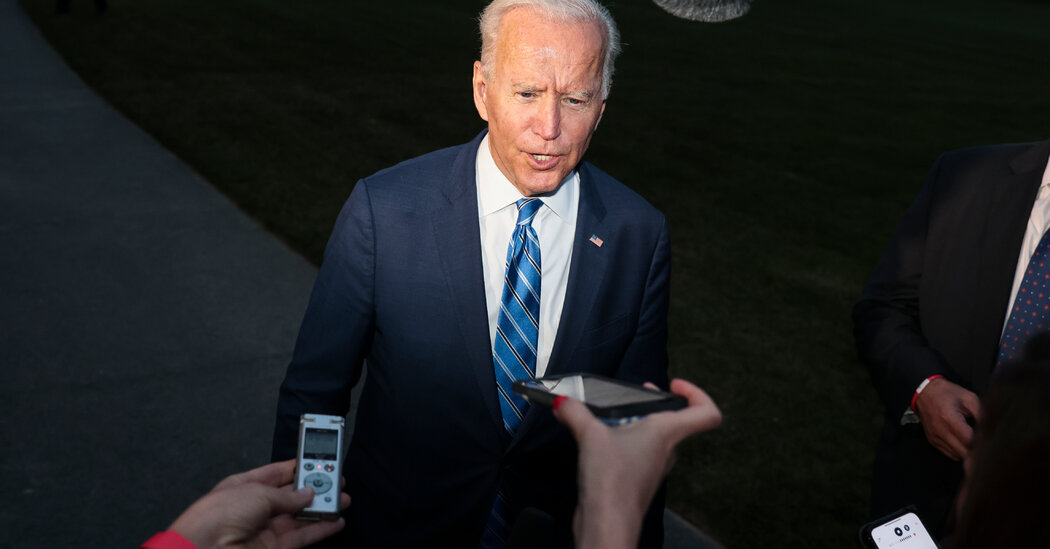
WASHINGTON — President Biden said on Tuesday that Democrats are considering a change to Senate filibuster rules to bypass a Republican blockade over raising the debt limit, which has set the United States on a collision course with a government default.
“Oh, I think that’s a real possibility,” Mr. Biden said when asked if Democrats were considering the last-resort route, which would involve making an exception to allow for a debt ceiling bill to pass with a simple majority instead of the usual 60 votes needed.
Senate Democrats discussed carving out the exception at their weekly lunch on Tuesday. No conclusions were reached, but notably, according to participants, the two strongest opponents of filibuster changes, Senators Joe Manchin III of West Virginia and Kyrsten Sinema of Arizona, did not speak up in protest. They also did not speak up in support.
The move, once nearly unimaginable in a chamber steeped in decorum, has come under discussion as the Biden administration and congressional Democrats have explored ways to head off a government default without Republican support. Treasury Secretary Janet L. Yellen has warned lawmakers of “catastrophic” consequences, including a recession and financial crisis, if Congress does not act before Oct. 18, when the government is projected to be unable to pay its bills.
On Wednesday, the Senate will vote on whether to take up legislation to raise the debt ceiling until December 2022. But with 10 Republican senators needed to join Democrats in support, the vote is expected to fail.
Some Democrats have expressed hope that if curbing the filibuster is the only avenue left, the party could muster 50 votes for the rule change.
Lawmakers have carved out other exceptions to the filibuster in recent years. In 2017, Senate Republicans created one to clear a path for Neil M. Gorsuch, President Donald J. Trump’s first Supreme Court nominee, to take the bench. And in 2013, Senate Democrats did so to overcome Republican opposition to President Barack Obama’s nominees for cabinet posts and judgeships.
Mr. Biden’s remarks on Tuesday evening, made as he returned to the White House after a trip to Michigan to sell a bipartisan infrastructure package and expansive social spending bill, reflected the president’s increasingly confrontational approach to a divided chamber that has presented him with one legislative obstacle after another as he tries to pass his domestic agenda.
“As soon as this week, your savings and your pocketbook could be directly impacted by this Republican stunt,” Mr. Biden said during remarks at the White House on Monday, cautioning that a failed vote on Wednesday could rattle financial markets, sending stock prices lower and interest rates higher. “A meteor is headed for our economy,” he said.
The president has also bristled at the ultimatum put forth by Senator Mitch McConnell of Kentucky, the minority leader, who has said Democrats must use reconciliation — a more complicated process that could take a week or more to come together — if they want to overcome Republican opposition to raising the debt limit.
Understand the U.S. Debt Ceiling
What is the debt limit? The debt limit is a cap on the total amount of money that the federal government is authorized to borrow via U.S. Treasury bills and savings bonds to fulfill its financial obligations. Because the U.S. runs budget deficits, it must borrow huge sums of money to pay its bills.
“I respectfully submit that it is time for you to engage directly with congressional Democrats on this matter,” Mr. McConnell wrote in a letter to Mr. Biden on Monday. “Your lieutenants in Congress must understand that you do not want your unified Democratic government to sleepwalk toward an avoidable catastrophe when they have had nearly three months’ notice to do their job.”
Mr. McConnell has said the government must not be allowed to stop paying its debts; he has also said he will not let any Republicans vote to raise the debt limit, while moving to block Democrats from doing so themselves. Republicans already held together to filibuster an earlier bill to increase the debt limit.
Once the Republicans again filibuster a debt ceiling increase on Wednesday, Democrats will have to plot a path forward — and quickly.
On Tuesday evening, the White House announced an event to keep up the pressure: a meeting between Mr. Biden and a group of executives on Wednesday to “immediately address the debt limit and the damaging consequences for American families, small businesses and the economy if unnecessary delay continues any further.”
Jonathan Weisman contributed reporting.



